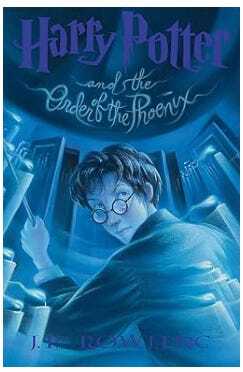Just how libertarian is the Harry Potter Series? AI led me to a startling answer

Everyone has their own opinions on the good old AI revolution. Some are 100 percent against this revolutionary tech, others are 100 in love with it, and there are numerous third, fourth, fifth, and infinite thoughts.
The Libertarian Book Reviewer is a reader-supported publication. To receive new posts and support my work, consider becoming a free or paid subscriber.
For me, I like to use it when I need it. If I need it, it’s there, and asking AI to clarify something is often my main motivator for using it. Well, that and, if I decide to dive into an unfamiliar genre that I’ve recently fallen in love with, like Steampunk, for example, it provides a great crash course to write fiction in IF one knows how to prompt it right.
Bad prompts lead to some horrific stories that contradict and repeat themselves. Trust me, I’ve tried it. But you’ll be surprised what the right prompts can do. So, for this one, the question was simple: What fiction book genres are best for libertarians?
Note, I said fiction and not nonfiction, since more than a few great libertarian historians, philosophers, and economists have done the dirty work for us. Fiction, however, is what’s lacking. And it’s something the great Ron Paul implied in one of his first Weekly Columns of the year.
The answer? Science Fiction and Fantasy. That’s a lifesaver, considering my own works contain elements of both. Dystopian fiction, naturally, was also mentioned, and it’s clear why that’s the case. Anyway, a few book series got a nice, little deep dive over at LFS.org in a piece by Ilya Somin all the way back in mid-2011. A source that AI linked when I typed in the prompt.
Curious, since I just told a story in a previous post about the Summer of 2011 that involved the next 13 months of my life. Anyway, back to the discussion at hand.
Science Fiction, Fantasy, and Harry PotterI didn’t kick things off by asking AI whether Harry Potter was a libertarian-oriented series. But if you read Order of the Phoenix, any libertarian would fall in love with the work in about two seconds. Yeah, they might despise Dolores Umbridge (who doesn’t?), but goodness, she makes Anthony Fauci look like a saint. Not really, but you see the point, I hope.
Anyway, we know J.K. Rowling, especially back in 2011, had a history of placing herself more on the liberal/progressive side of the spectrum. At least until she said something that those same liberals/progressives didn’t like and they basically rendered her an outcast over it. But then again, this was someone whose main character and few others had the courage to say ‘Voldemort,’ so at least Rowling’s being true to herself here.
Other authors mentioned included George R.R. Martin (Game of Thrones) and J.R.R. Tolkien (Lord of the Rings). Still, Rowling’s work jumped out at me the most, since A) It’s my favorite, and B) I’ve long found it somewhat ironic that a liberal/progressive had it in them to make big government look bad.
Somin wrote the following:
Rowling’s work isn’t a perfect rendition, however“In his article “Harry Potter and the Half-Crazed Bureaucracy,” law professor Benjamin Barton points out that the Ministry exemplifies the worst nightmares of libertarian public choice economists. It is a government that consists almost entirely of unaccountable bureaucrats who pursue their narrow self-interest at the expense of the public good. Ministry officials routinely abuse their powers with little or no effective constraint imposed by the press, public opinion, or the democratic process. They violate civil rights, imprison the innocent, and engage in crude propaganda. When pompous Ministry bureaucrat Dolores Umbridge temporarily takes over as headmistress of the heroes’ Hogwarts School of Witchcraft and Wizardry, she institutes a virtual reign of terror.”
While it’s true that Rowling went out of her way to chastise big government, she’s committed one fallacy that I see at times in fiction: Replacing that government with the ‘right people.’ Rowling heavily implies that the reformed Ministry of Magic following Deathly Hallows runs things more smoothly than what we’d seen under Cornelius Fudge, Rufus Scrimgeour, and Lord Voldemort’s puppet government.
And I’ll concede that it’s true your mainstream Left and mainstream Right may think, “All was well,” when their people are in charge, raw numbers and data say otherwise. It’s why I loved it when the media came out and acted like the economy was “booming” because of six-figure job growth under the Biden presidency, only for Ryan McMaken at the Mises Institute to put those claims to sleep with ease.
Thanks for reading The Libertarian Book Reviewer! This post is public so feel free to share it.
Not to mention the $36 trillion debt, massive foreign aid, lower standards of living thanks to inflation via the COVID crisis, I can go on and on here. So, we’ve spent decades trying to put ‘the right people in office,’ but it hasn’t happened yet, and I don’t foresee it being the case if government continues to grow.
I’ll also concede that Donald Trump hasn’t done a half-bad job at this point, but what’s three weeks into one’s second presidency to go on? At this point, Javier Milei down in Argentina may be as close as to ‘the right person in office,’ but he doesn’t come without his flaws. Anyway, I hope I’m wrong here, and that Trump knocks it out of the park between now and 2028.
All of that said, Rowling did show us that the Ministry put plenty of the wrong people in charge, not just one bureaucrat’s administration. So she gets a few points for that. Here’s what Somin said about ‘the wrong people:’
Arthur Weasley was well-intentioned?“Throughout the series, Rowling implies that the Ministry’s flaws are structural, not merely a result of the wrong people being in power. Even after the ineffectual Minister of Magic Cornelius Fudge is replaced in the sixth book by a more decisive leader, the Ministry’s performance does not improve. There are some well-intentioned and competent officials in the Ministry, such as Ron’s father Arthur Weasley. But they are unable to effectively oppose the more ruthless bureaucrats who dominate the organization. The idea that the flaws of government are inherent and can only be alleviated by limiting the state’s powers is, of course, central to libertarian thought.”
I’d actually disagree with Arthur Weasley being “well-intentioned.” Instead, I’d call him the stereotypical “least of the evils.” In Book II, Chamber of Secrets, Arthur, head of the Misuse of Muggle Artifacts Office, intentionally left open a loophole in the law that, legally, allowed him to bewitch a Ford Anglia to fly, claiming a clause in the law that bewitching it was legal if one didn’t intend to fly, or use it for the wrong reasons.
Of course, his wife, Molly, called him out. And I’m paraphrasing, “You made sure that loophole was there when you wrote that law, Arthur Weasley.”
So, back to my main point: Going by recent history, ‘the right people’ just haven’t transformed from fiction into reality. That said, Rowling did get a few more things right with Harry Potter and libertarianism.
Harry Potter and the Order of the Phoenix is the gold standardIf any of you have never read a single word of the Harry Potter Series but you want the most libertarian book in the series, look no further than Order of the Phoenix. Somin cites several aspects of this book, which drives home the point that you can’t get any more libertarian than OP.

Not but only is the Ministry so flawed it’d make the former Biden/Harris administration at least look somewhat decent; it had the legacy media - the Daily Prophet - serving as its greatest cheerleaders. Especially when it came to smearing Harry and his mentor/Hogwarts headmaster, Albus Dumbledore.
“The Ministry also signally fails to carry what even most libertarians agree is a core function of government: defense against attack. Despite repeated warnings from Harry, his mentor Albus Dumbledore, and others, the Ministry remains oblivious to the threat of Voldemort until it is far too late. The only genuinely effective opposition to Voldemort is provided by the Order of the Phoenix, a private organization.”
Somin ends the section with the following thoughts:
Is Harry Potter the king of libertarian fantasy?“Nevertheless, the Harry Potter series reflects a suspicion of government almost as great as that of libertarians. Barton speculates that Rowling’s negative portrayal of the wizard government stems from her own unpleasant experiences with British welfare bureaucrats during her years as a poor single mother. Be that as it may, the series certainly incorporates some strongly libertarian themes, whether or not that was the author’s conscious intention.”
That’s up for debate. A Harry Potter fan who knows his House (Ravenclaw), his wand (Laurel, with Dragon Heartstring), and even his Patronus (Black Mamba), would have a clear bias. Plus, in late 2024, I admitted I’d never gotten around to reading Lord of the Rings, and that it too graced my 2025 TBR list.
I also never cared for Game of Thrones, if you want my honest answer. I don’t know, it just wasn’t for me and I gave up after about 90 minutes. That said, I’d naturally call Harry Potter king at the moment, but we’ll see what happens when I’m introduced to Tolkien.
Either way, if you’re libertarian and you have nothing against Harry Potter - I know quite a few people who still won’t read it because of its magical elements which pales in comparison to actual witchcraft - then I’ll highly recommend it now, and, most likely 50 years from now. Hopefully, I’m still hitting the gym hard a half-century from today!!
Anyway, Harry Potter is easy to read, the setting of Hogwarts becomes a character in and of itself, and there are few plots that are better put together. If Potter isn’t the king of libertarian fantasy, it’s definitely up there.
My upcoming young adult libertarian fantasy, Arcane Elemental Academy, might be lucky enough to become a foot soldier as far as libertarian fantasy goes. You can get your free prequel to the series, Arcane Awakenings, and join my mailing list, where I’ll talk about Harry Potter inspiring the series along with quite a few of the greatest libertarian thinkers out there. Especially those in the education niche.



